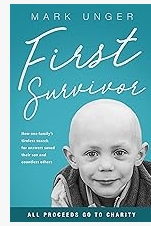
First Survivor is a labor of love and advocacy by author Mark Unger, educating the public not only on being advocates for their loved ones but also seeking out and participating in clinical trials. Unger’s writing pulled at my heartstrings as I rode the roller coaster of emotions of each member of the family, from the bravery of Louis, the anxiety of parents, and the mixed emotions of Harry. I really appreciate that he also incorporated how patient and kind the physicians and nurses were in answering questions and suggesting ways to keep Louis comfortable.
Having been a nurse of adults with cancer at a major teaching a research hospital, I got to see and feel these feelings with families. Unger does a great job blending the family member’s memories and journal entries from in the heat of the cancer battle to help readers also feel the complex emotions and absorb the overwhelming amount of information, in what can seem like a foreign language. Clinicians can forget to adequately explain these terms to overwhelmed families, but through Unger’s questions and seeking answers, he was not able to only better understand the care his son was receiving but also has now educated other families that it is okay to ask questions and seek more information.
I cannot tell if First Survivor is a self-published book or not, but the use of a medical editor may have caught the minor errors as a registered nurse with oncology experience identified in the book. (I read this via the Kindle application.) Minor errors such as the occasionally misspelled medication and some alignment issues in areas such as the table of contents and changing the size of the table on the history of survival between the two pages it is on occurred but did not take away from the strength of the story. I am grateful that Unger decided to include a glossary to help those in the general public learn some of the medical jargon used in cancer care. Yet, I found the additional section called Medical Background redundant, even though it did include some terms not included in the glossary and did go into much further detail for those who might be interested.
As a nurse who has worked with adult cancer clients and is now transitioning into the role of nurse scientist, I really appreciate the effort that was put into First Survivor. I am giving this book 4 out of 5 stars, related to the minor errors above, recognizing Unger’s privilege of being in a high position within the family company allowed him time and financial means to research and advocate for his son’s health and write this book. This is a privilege few have, and I am grateful he used that privilege to break down barriers in healthcare to allow for more family and clinician collaboration and communication. I know many patients of various ages and disease processes are living better lives because of including the patient and family as part of the healthcare team.


Great post. I was checking continuously this blog and I’m impressed! Extremely helpful info particularly the last part 🙂 I care for such info much. I was looking for this particular information for a long time. Thank you and good luck.